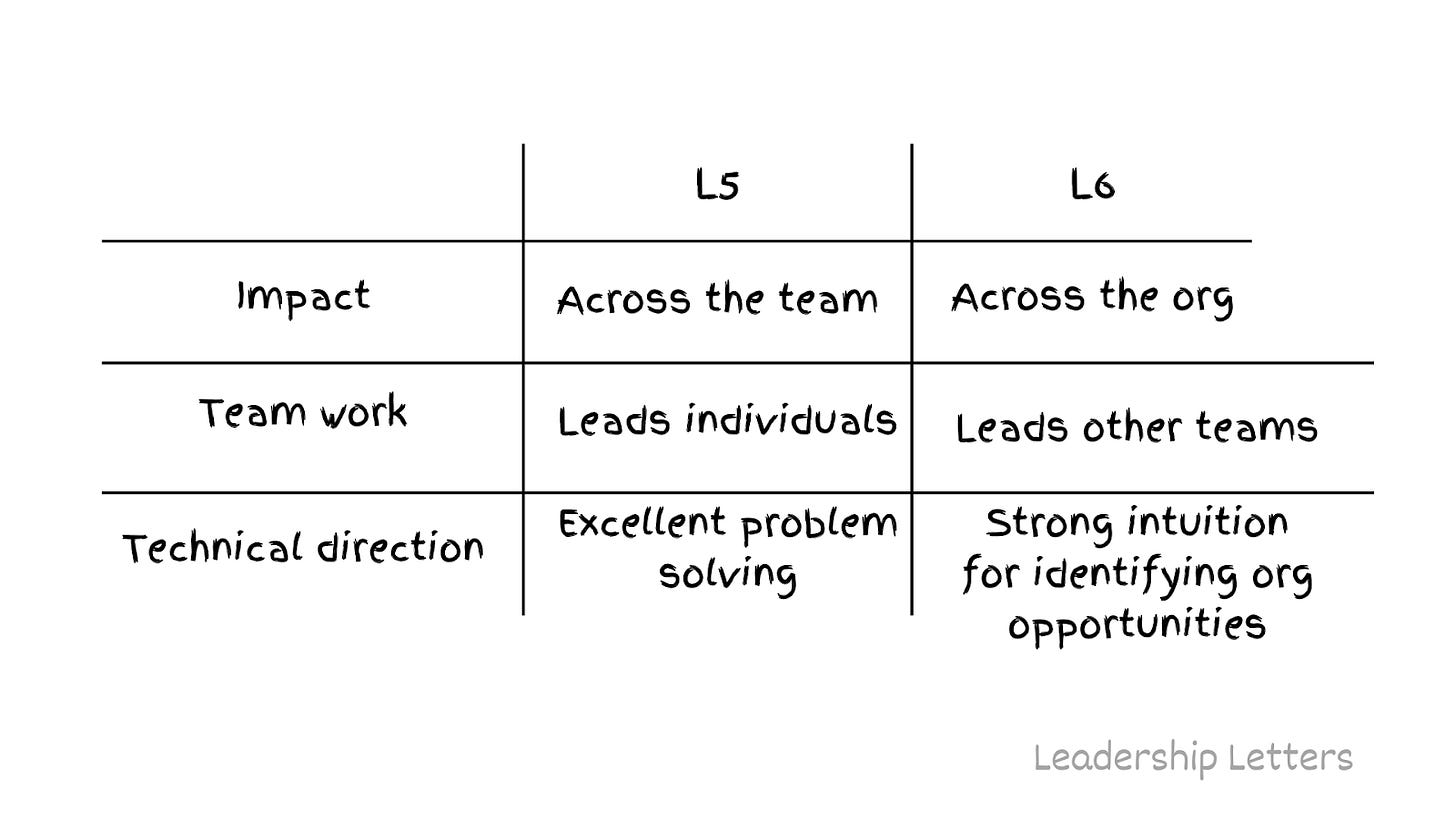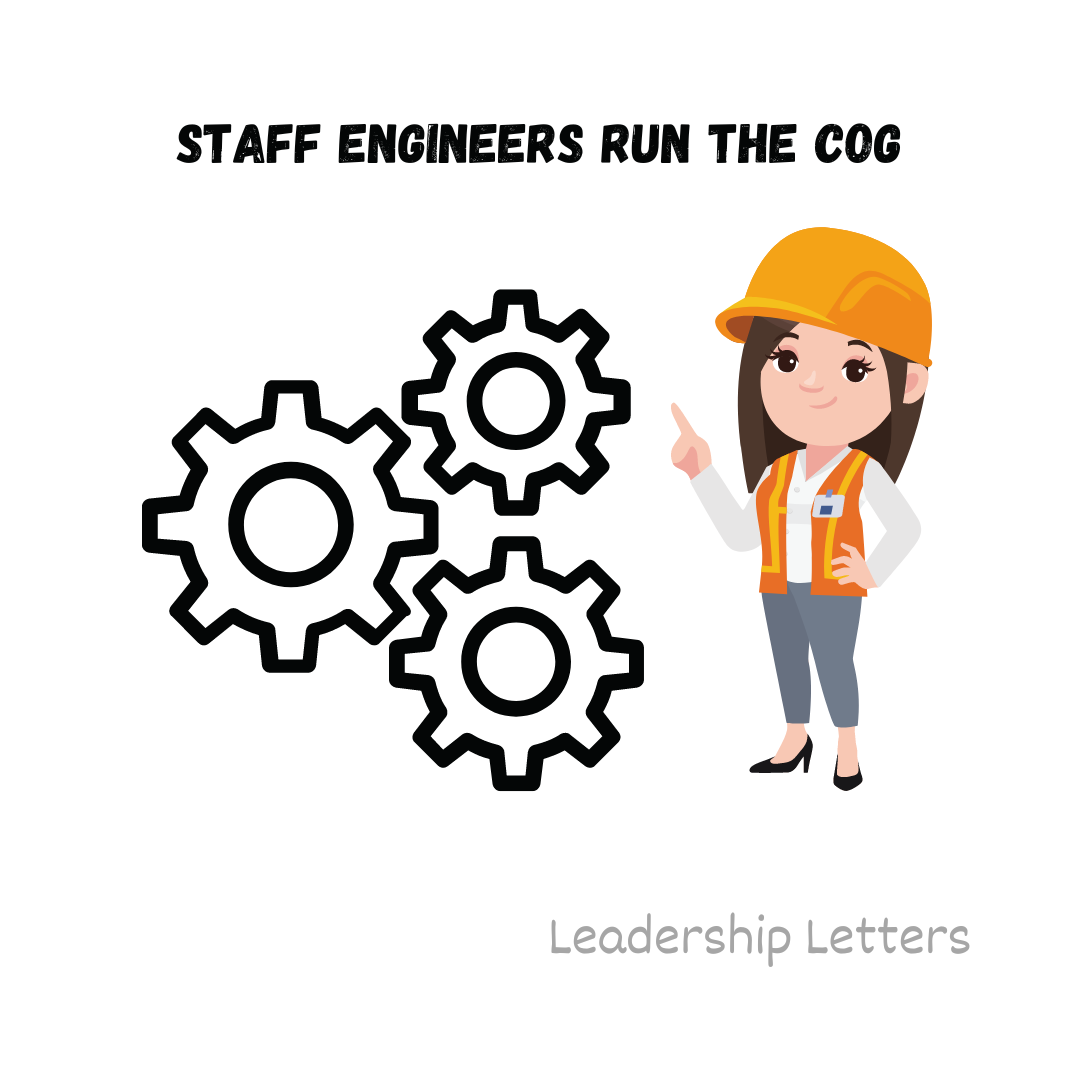Why It Takes Forever to “Get to Staff”
3 changes to accelerate your Staff promotion
👋 Hi, this is Akash with this week’s (delayed) newsletter. I write about leadership and growth in software engineering. Thank you for your readership ❤️.
This week, I am sharing why the Staff level is considered a different job. Tips I share here will help you prepare for your next promotion. Hope you enjoy this edition!
How often have you heard others say, “Staff engineer is a completely different job”?
What does that even mean? Isn’t staff the next growth level after senior?
The first time I had my “to-staff” career conversation with my manager, he said, “Staff engineering is not about being an expert senior engineer; it’s a new role”.
I left the conversation confused, asking myself, “Do I even want this role?”
If you’re in a similar situation, don’t worry. Most people looking for staff promotion go through the same thought process.
Today, we will discuss it with examples from my experience. The examples will help you plan your strategy to break the senior engineer ceiling.
⭐ Main Takeaways
What are the differences between a Senior and a Staff Engineer?
3 practices that will push you for your Staff promotion.
🎤 Announcement: New podcast episode
I highly recommend checking out this podcast episode. I share tips and tricks to break into FAANG. We also discuss taking control of your growth by investing outside your day job.
Expectations from a Senior vs a Staff Engineer
Have you heard of the term “L5/6 scope work”? Most companies today expect their people to perform at the next level before handing out promotions. Finding appropriate projects for career growth becomes crucial.
What makes you perform at the Staff level
1) Transition from problem-solver to organizational thinker
A senior engineer is an efficient problem solver. My biggest struggle in staff transition was I wasn’t sure what was expected of me.
As a senior engineer, do you sometimes feel “What is an L6 scoped work?”.
After much trial and error, I learned the following about staff engineers:
They aren’t told what to do
Their focus shifts from team to organization
They define priorities for the organization using their credibility
You can do many things to align your performance along these dimensions. Here’s what I recommend,
Spend time speaking with leaders across the organization to establish a solid business context.
To the director: “What are the top three business objectives to solve over the next two years?”
To peer leaders: “What parts of X make your life difficult?”
Draft a detailed plan and establish collaborative partnerships
Set the priorities for your organization and influence other team’s workstreams.
Collaborate with leaders from your surrounding teams to align on vision
Define a clear project plan and get buy-ins from all stakeholders
Dedicate 20% of your time to fixing organizational problems
Cultural: Lead information sessions/book clubs to foster collaboration
Technical: Lend your expertise in solving problems beyond your immediate team.
One thing was common in most of the quick growth of staff engineers. They took advantage of the credibility they built, getting to senior levels, and influenced the organization’s future shape in multiple dimensions.
2) Master the corporate politics and get comfortable saying “no”
Engineers are wired to solve problems. Growing to a senior role requires solving as many problems as possible. Because of this, I struggled to say no to anyone.
It quickly turned into dropping things left to right. At times, I stretched my work hours to support the extra load. One of my mentors at the time said, “You need to say no more often and better”. I had no clue how.
That day, I walked away with three most valuable lessons as an engineer,
Don’t just say no.
❌ “We already have a large backlog with prioritized projects. Unfortunately, we can’t take on more at the moment.”
This is prone to escalation, at which point it becomes a “something” measuring contest.
✅ “Our organizational priority is A (link to your Director+ OKR). This contributes more towards B. Were there any other reasons we are looking at this now?”
It gives them context and time to rethink their ask. Highlighting the consequences of taking this extra load can also help make a solid case for “no”.
Understand the influence of key individuals.
“I briefly discussed this with Mark, and we both agree that project C can wait till we finish up A & B.”
Adding someone everyone respects to your rationale helps unblock the most challenging roads.
Help out when it’s not too much.
The corporate world works similarly to society. Leverage plays a vital role as you move up.
“Doing M isn’t exactly aligned to our overarching goals, but let’s make an exception.”
Depressing? I know! Who said the world was perfect?
Staff+ engineers increasingly get involved in such conversations. Develop the skills to handle issues on your own. Leaders like those who solve conflicts without escalating every single time.
3) Grow people around you
The most underrated characteristic of staff engineers is helping others. A staff engineer is responsible for growing the business and the people, too.
If you’re a senior looking to grow to staff,
Mentor L4s/L5s in your organization.
You don't get kicked out when you help others grow to replace you. You go up!
Share your knowledge wider.
I’ve seen people host 30-minute knowledge sessions for new members. Recording them and building an archive can improve your organization’s onboarding.
Lend your deep technical expertise.
Most influential senior engineers are called to review architecture, designs, etc. There’s no immediate benefit, but you build relationships that establish you as “rising” staff.
🗒️ Note
I apologize for missing the Friday schedule this week. Although the article was ready, I was not satisfied with the material. Going to a conference the whole week didn’t help much either. Thank you for your continued support and understanding.
🌟 🔍 Parting Thoughts
Leveling in engineering is like a pyramid. The higher you go up, the less opportunity. There’s always a “luck” factor: right time, right place.
If you practice the three things we discussed today, it will set you apart. When I was going through this transition, I was told these things, but they lacked examples that I could apply.
This article will help you grow beyond senior. To recap, here’s what we covered,
Become organizational thinker
Spend time speaking with leaders across the organization to establish a solid business context.
Draft a detailed plan and establish collaborative partnerships
Dedicate 20% of your time to fixing organizational problems
Master politics and saying no
Don’t just say no
Understand the influence of key individuals
Help out when it’s not too much
Grow others around you
Mentor L4s/L5s in your organization
Share your knowledge wider
Lend your deep technical expertise
What are some of the blockers of growth you face,
Share them in the comments!
🐦🔥 This Week’s Favorites
How to say no from High Growth Engineer by Jordan Cutler and Sidwyn Koh
What type of SWE you want to be from The T-Shaped Dev by Petar Ivanov
Benefits of mental models in SWE from Perspectiveship by Michał Poczwardowski
How to keep your good manager from Engineering Leadership by Gregor Ojstersek
👋 💬 Get In Touch
Want to chat? Find me on LinkedIn.
If you want me to cover a particular area of leadership, you can reach out directly to akash@chromium.org.
If you enjoyed this content, please 🔁 share it with friends and consider 🔔 subscribing if you haven’t already. Your 💙 response really motivates me to keep going.





Great insights and examples, Akash.
I enjoyed how the perspective shifts to the organisational level!
PS Thanks for the shoutout about the article on mental models.
I missed reading your article last Friday, but I appreciate that you took the time to revise it to your satisfaction. I recently listened to the podcast with Sitesh and thoroughly enjoyed it. I’ve been also struggling to to read the countless books and materials I come by. I liked your tip about blocking off time weekly, will surely try this out! Additionally, I liked your emphasis on the importance of open-sourcing knowledge and your initiative with this newsletter, sharing your lessons & experiences. Thank you!